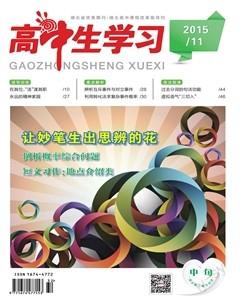虚拟语气“三切入”
龚鹏
一提到英语虚拟语气,许多同学就感到不寒而栗。作为谓语动词的一种属性,要达到掌握和正确运用的程度,有一定的难度,却是完全可以做到的。关键是要找准并掌握虚拟语气这一高考热点的切入点。以下是三条学习虚拟语气的轻松快捷的途径。
切入点一、虚拟条件句
1. 与现在事实相反的虚拟条件句的基本结构为:主语+should/would/could ...+动词原形+其他成分+if+从句主语+动词的一般过去时(be动词用were)+其他成分。
例1 Sorry, I am too busy now, if I time, I would certainly go for an outing with you.
A. have had B. had had
C. have D. had
解析 D。句意为:很抱歉,现在我太忙,如果我有时间,我当然会和你一起去郊游。题干是一个与现在事实相反的虚拟条件句。
2. 与过去事实相反的虚拟条件句的基本结构为:主语+动词的过去完成时+其他成分+if+从句主语+should/would/could ...+have done+其他成分。
例2 If I it with my own eyes, I wouldnt have believed it.
A. didnt see B. werent seeing
C. wouldnt see D. hadnt seen
解析 D。句意为:如果不是我亲眼看到,我不会相信。根据后半句可以判断是对过去的虚拟,所以从句的谓语要用过去完成时。
3. 与将来事实相反的虚拟条件句的基本结构为:主语+should/would/could ...+动词原形+其他成分+if+从句主语+动词的一般过去时/should do/were to do+其他成分。
例3 Grace doesnt want to move to New York because she thinks if she there, she wouldnt be able to see her parents very often.
A. lives B. would live
C. having asked D. were to live
解析 D。句意为:格丽丝不想搬到纽约,因为她想如果她在那儿生活,她将不能与父母经常见面。句子叙述的是与将来事实相反的假设。
4. 错综虚拟条件句
在有些虚拟条件句中,主、从句时间不一致,应根据不同情况区别对待。
例4 If he had spent more time practicing speaking English before, he able to speak it much better now.
A. will be B. would be
C. has been D. would have been
解析 B。句意为:如果他以前多训练英语,现在英语可能会讲得更好。从句在叙述与过去事实相反的条件,主句在叙述与现在事实相反的结果。
5. 含蓄虚拟条件句
这样的虚拟条件句不含有if从句,而是以but for/without/or/otherwise等及相关成分代替if从句,主句的谓语动词形式与前面所述虚拟条件句的谓语的基本结构相同。
例5 Without his wartime experiences, Hemingway his famous novel A Farewell to Arms.
A. didnt write B. hadnt written
C. wouldnt write D. wouldnt have written
解析 D。句意为:没有他战时的经验,海明威就不可能写出著名的小说《永别了,武器》。根据without his wartime experience,可知是表示与过去事实相反的假设,主句谓语用would have done.
切入点二、虚拟建议句
1. 在含有表示“坚持、命令、建议、要求”等含义的动词insist, order, command, advise, propose, suggest, recommend, ask, demand, request, require等后面的宾语从句中,从句的谓语需用“should+动词原形”,其中 should可以省略。
例6 My mom suggests that we eat out for a change this weekend.
A. should B. might C. could D. would
解析 A。句意为: 我妈妈建议这个周末出去吃饭,换换口味。suggest作“建议”讲,其后宾语从句要用虚拟语气,从句中的谓语部分要用should do形式,should可以省略。
2. 在下列句型的主语从句中,从句的谓语需用“(should)+动词原形”。
(1)It is+-ed分词(required, suggested, ordered, demanded, requested等)+主语从句;
(2)It is+名词(a pity, a shame, no wonder, desire, decision, wish等)+主语从句;
(3)It is+形容词(important, necessary, natural, strange, proper, right, best/better等)+主语从句。
Dont you think it (is) necessary that he not be sent to Miami but to New York? 难道你不认为必须把他送到迈阿密而不是纽约吗?
3. 在“主语+系动词+表语”的句型中,如果主语是order, command, advice, proposal, suggestion, demand, request, requirement等,表语从句的谓语需用“should+动词原形”,其中should可以省略。
The demand is that manuscripts should be written on one side only. 按照要求,手稿只能单面誊写。
4. 名词order, command, advice, proposal, suggestion, demand, request, requirement等后面接that引导的同位语从句中的谓语需用“should+动词原形”,其中 should可以省略。
He gave orders that the work should be started at once. 他下令立即开始工作。
5. for fear that, in case, lest等引导的状语从句中,用“should+原形动词”表示“唯恐”。
He handled the instrument with care for fear that it should be damaged. 他小心拿着仪器,唯恐把它摔碎了。
切入点三、虚拟想像句
1. 在wish的宾语从句、as if /as though引导的表语从和状语从句和if only后从句的谓语要用虚拟语气。
(1)表达与说话的时间同时的动作,从句的谓语用过去时,be多用were;
(2)表达在说话的时间之前的动作时,从句的谓语用过去完成时;
(3)表达在说话的时间之后的动作时,从句的谓语用过去将来时。
例7 I wish I at my sisters wedding last Tuesday, but I was on a business trip in New York then.
A. will be B. would be
C. have been D. had been
解析 D。句意为:上个周二我本希望参加我姐姐的婚礼,但那时我在纽约出差。考查wish引导的宾语从句,表示过去未曾实现的愿望时,从句的谓语用过去完成时。
例8 It was John who broke the window. Why are you talking to me as if I it?
A. had done B. have done
C. did D. am doing
解析 A。句意为:打破玻璃的是约翰,为什么你和我说话,好像是我打破了一样。根据前一句中的was说明打破玻璃是在说话时间之前的的事情,因此虚拟条件从句要使用过去完成时。
2. 在would rather后宾语从句的谓语多用过去时,表示在说话之前的动作也可用过去完成时。
例9 We would rather our daughter at home with us, but it is her choice, and she is not a child any longer.
A. would stay B. has stayed
C. stayed D. stay
解析 C。句意为:我们宁愿我们的女儿待在家里,但是这是她的选择,她已经不再是孩子了。根据句意可知是与现在情况相反的愿望,从句的谓语用一般过去时。
3. 在句型It is (high/about) time (that) ...后面也跟虚拟语气的从句,从句的谓语中常用过去式,间或用“should+动词原形”,意为“该是……的时候了”。
It is time (that) we went home 我们该回家了。
[练习]
请解答下列高考真题:
1. (2015·陕西)Ellen is a fantastic dancer. I wish I as well as her.
A. dance B. will dance
C. had danced D. danced
2. (2015·江苏)It might have saved me some trouble the schedule.
A. did I know B. have I known
C. do I know D. had I known
3. (2015·安徽)It is lucky we booked a room, or
we nowhere to stay now.
A. had B. had had
C. would have D. would have had
4. (2014·北京)We back in the hotel now if you didnt lose the map.
A. are B. were
C. will be D. would be
5. (2014·福建) no modern telecommunications, we would have to wait for weeks to get news from around the world.
A. Were there B. Had there been
C. If there are D. If there have been
6. (2014·湖南)If Mr. Dewey present, he would have offered any possible assistance to the people there.
A. were B. had been
C. should be D. was
7. (2014·天津) the morning train, he would not have been late for the meeting.
A. Did he catch B. should be catch
C. has he caught D. Had he caught
8. (2014·浙江)They were abroad during the months when we were carrying out the investigation, or they to our help.
A. would have come B. could come
C. have come D. had come
[参考答案]
1. D。句意为:Ellen是一个很棒的舞蹈演员。但愿我能和她跳得一样好。I wish“但愿”后面接宾语从句用虚拟语气,和现在相反用一般过去时。
2. D。句意为:如果我早知道日程安排,可能会省去我一些麻烦。主句是对过去的虚拟,if虚拟条件句中含有had时,可将if省去,同时将had提前构成倒装结构。
3. C。句意为:我们很幸运地订到了房间,否则的话,我们现在就会无处可去了。考查的是or引导含蓄虚拟条件句,根据now可知,是对现在进行虚拟,因此用would+动词原形。
4. D。句意为:如果你没有把地图丢了,我们现在就会在宾馆里了。考查的是if条件状语从句的虚拟语气。表示与现在事实相反时,根据从句的did可知本句是与现在事实相反。
5. A。句意为:如果没有现代的电信业,要想得到世界各地的消息,我们就不得不等几个星期。考查的是if条件句的虚拟语气,表示与现在相反,在if被省略的时候,要使用部分倒装。
6. B。句意为:如果Mr. Dewey在场,他就会向那里的人提供保证。考查的是与过去事实相反的虚拟语气,因此从句中使用过去完成时。
7. D。句意为:如果他赶上了早班火车,他就不会开会迟到了。本题是一个条件状语从句的虚拟语气,表示与过去事实相反。当条件句中的if省略的时候,要把had提前形成部分倒装。
8. A。句意为:在我们进行这项调查的这几个月里,他们在国外,要不然,他们就会来帮助我们的。本句是一个含蓄的虚拟条件句,因为前面句中使用的是were,说明这个虚拟语气是与过去事实相反。

